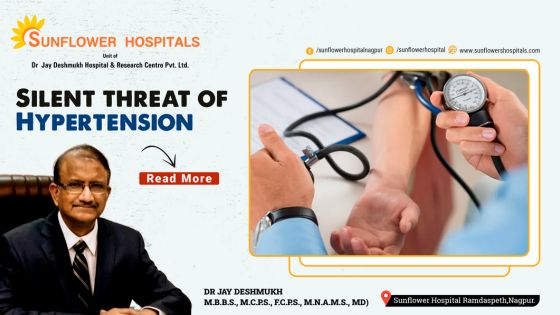What is hypertension, and why is it called a silent killer?
High blood pressure is a chronic condition where the force of the blood against the arterial walls is consistently too high, more than 120/80 mm. It is called a silent killer because it often causes no obvious symptoms. Symptoms occur until significant damage has already occurred in vital organs like the heart, brain, kidneys, and eyes. This silent progression makes early detection and treatment very important.
What are the common causes and risk factors of hypertension?
Hypertension can be primary or secondary. Essential hypertension has no identifiable cause. It is however linked to your genetics, ageing, obesity, sedentary lifestyle, high salt and alcohol intake, and stress. Secondary causes include kidney disease, certain hormone disorders, obstructive sleep apnoea, and certain medications like steroids and certain painkillers.
What are the dangers of uncontrolled hypertension?
Uncontrolled hypertension can lead to serious and potentially fatal complications including heart disease like swelling of the heart, heart failure,e, and heart attacks. Both ischaemic and hemorrhagic stroke, kidney failure, retinopathy, dementia, and aneurysms can occur. Better and early control can prevent these outcomes.
How is blood pressure classified according to current guidelines?
It may fall under the category of normal blood pressure, elevated blood pressure, hypertension stage 1 and hypertension stage 2, and hypertensive crisis. A normal blood pressure is 120/80 mm. Diagnosis is based on multiple readings on separate occasions.
What symptoms might suggest 5 complications of hypertension?
Though hypertension is itself without symptoms, symptoms if present may indicate target organ damage. Headache and dizziness may suggest brain involvement. Blurred vision may suggest hypertensive retinopathy. Swelling of legs and excess urination at night may indicate heart or kidney involvement. Confusion or limb weakness may raise the possibility of stroke or encephalopathy due to hypertension.
How is hypertension diagnosed?
Blood pressure needs to be measured by a validated sphygmomanometer. Ambulatory BP monitoring (ABPM) or home BP monitoring (HBPM) is often used for confirmation. End organs or target organs need to be evaluated. The tests may include ECG, serum creatinine, urine examination, retinopathy evaluation and some more tests to rule out secondary causes of hypertension.
Author: Dr Jay Deshmukh
Dr Jay Deshmukh is Chief Physician and Director, Sunflower Hospital, Nagpur Honorary Physician to Honorable Governor of Maharashtra and PondicherryCentral. Dr Jay Deshmukh is an M.B.B.S., M.C.P.S., F.C.P.S., M.N.A.M.S., MD From Internal Medicine – Bombay and New Delhi.


